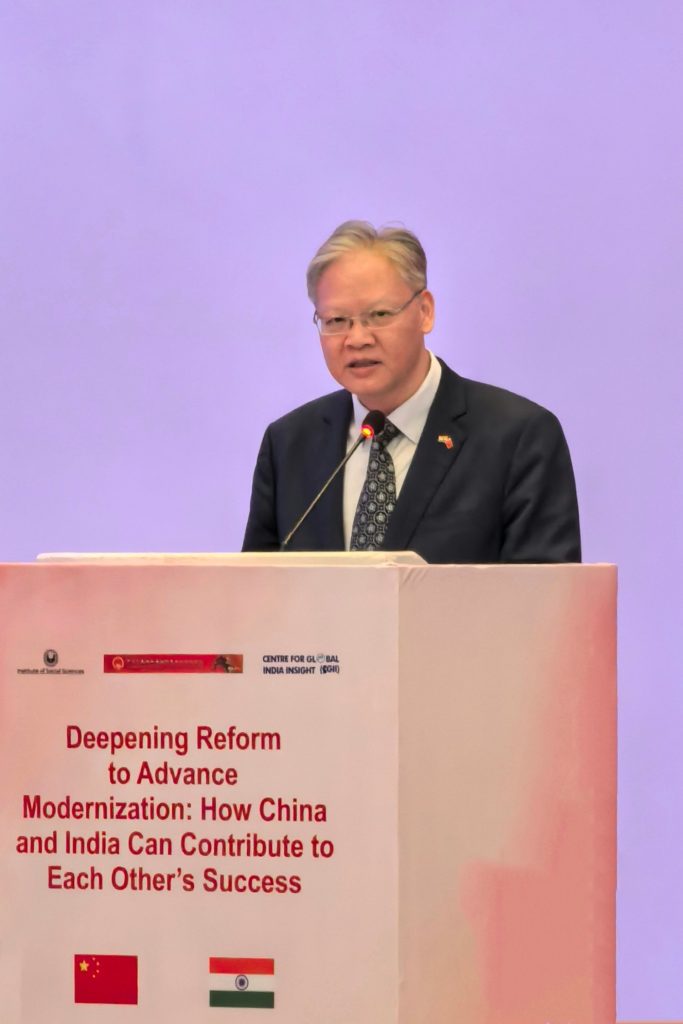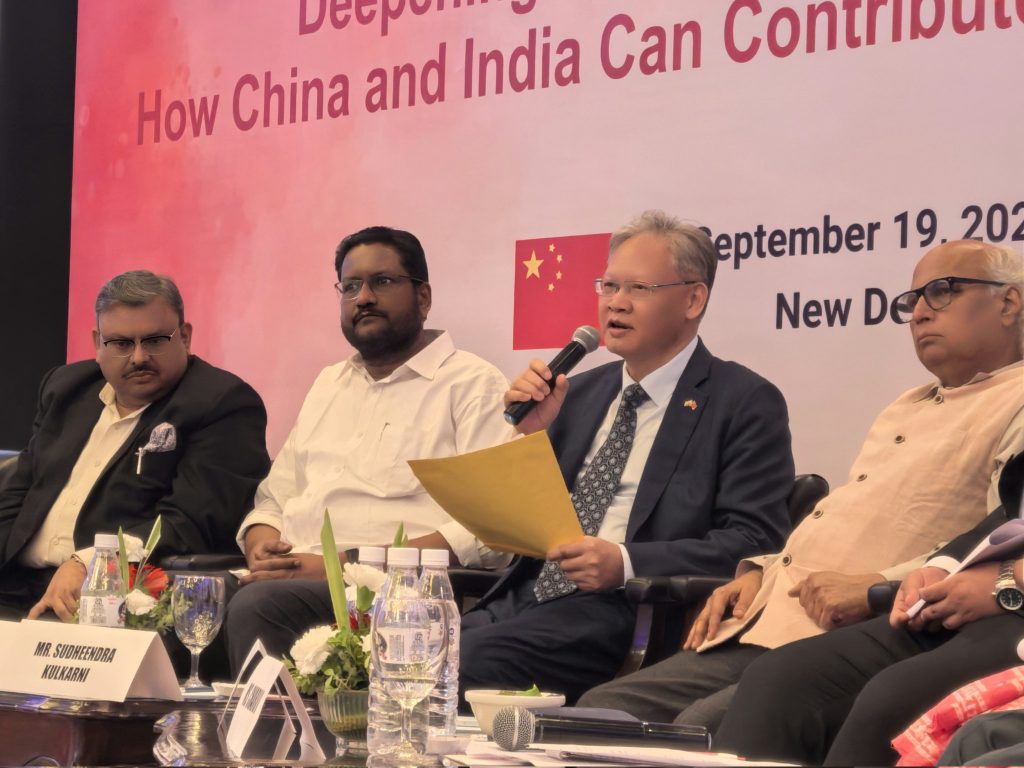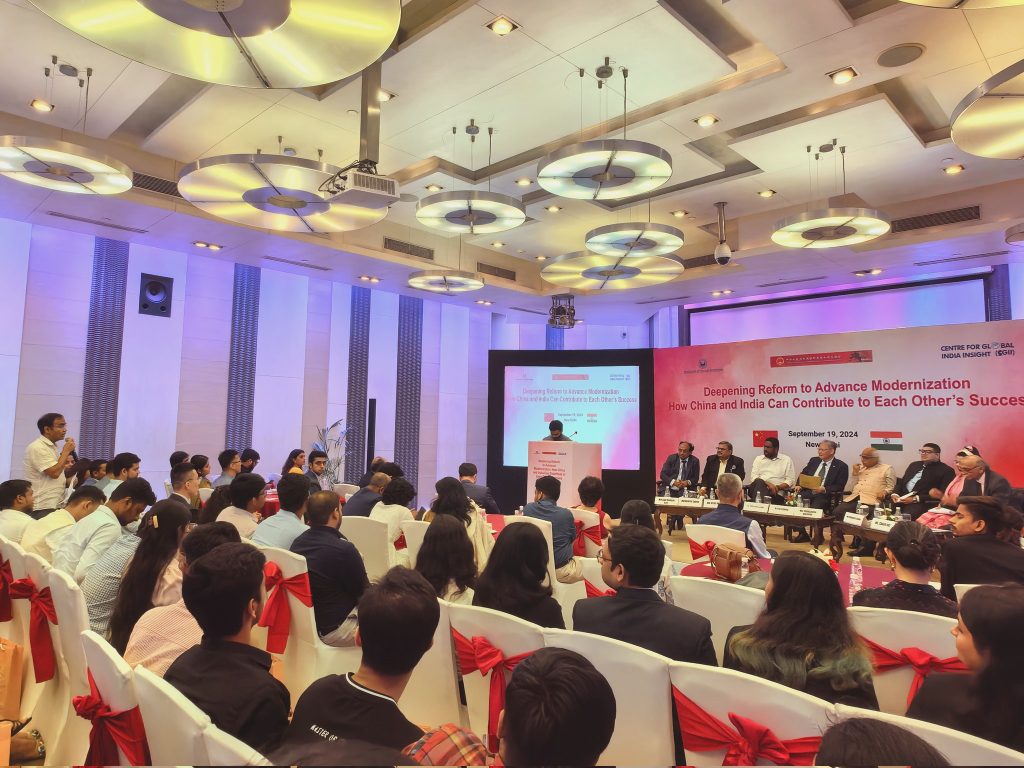
Amid signs of a possible thaw in bilateral relations, Chinese Ambassador to India Xu Feihong has said that the leaders of India and China have reached important consensus that China and India
are partners and not rivals.In a keynote speech delivered at the forum titled “Deepening Reform to Advance Modernization: How China and India Can Contribute to Each Other& Success,” the
Chinese Ambassador to India highlighted the need for stronger bilateral collaboration between the two Asian giants. In celebration of the 75th anniversary of the founding of the People& Republic of China, the Embassy of the PRC, in collaboration with the Centre for Global India Insights, a think tank focused on global affairs, and the Institute of Social Sciences, organised a
conference in New Delhi on September 19,2024. The conference focused on reform, modernization, and cooperation between the two nations, underscoring their shared aspirations and developmental trajectories. Ambassador Xu’s remarks came at a critical juncture for both countries, as they each pursue modernization strategies to uplift their respective economies and
societies. “China and India are important neighbours, major developing countries, and emerging economies,” Xu stated, adding that both nations are at a “critical stage of national development
and rejuvenation. “Modernization Through Reform The Chinese ambassador began by reflecting on the outcomes of the recently held Third Plenary Session of the 20th Central Committee of the
Communist Party of China (CPC). This plenary session, Ambassador Xu noted,” drew up the grand blueprint for further deepening reform comprehensively and advancing Chinese modernization.
The core objective of this reform, according to Ambassador Xu, is to improve the system of socialism with Chinese characteristics while modernizing the country’s governance structures.” By
2035, we will have finished building a high-standard socialist market economy in all respects” ; Ambassador Xu said, emphasizing that “this would lay a solid foundation ” for China’s modernization. He highlighted the significant reform measures introduced at the plenary session, which cover economic, social, and political modernization efforts. China has charted a clear roadmap, with
over 300 major reform measures to be completed by 2029. Deepening Cooperation with India While discussing China’s path, Ambassador Xu quickly shifted to emphasize the potential for India and China to learn from each other. He praised India’s economic reform journey under the leadership of Prime Minister Narendra Modi. “India’s policy of ‘Reform, Perform and Transform’ has propelled its rapid economic development and improved living standards,” Ambassador Xu noted, underscoring the similarities between the two nations’ development paths.

The Chinese ambassador called for increased cooperation between India and China to facilitate mutual progress. “Only China and India can understand how many efforts should be made to promote reform in a country with a population of 1.4 billion,” he remarked. He encouraged both nations to synergize development strategies, learn from each other strengths, and make progress together. In particular, he highlighted trade and economic cooperation as a key area where both countries could benefit from each other’s strengths. He pointed out that China remains India’s largest trading partner, with a bilateral trade volume of $136.2 billion in 2022. Furthermore, Chinese companies operating in India have contributed to the country economic growth by creating employment opportunities for Indian citizens. ” Development is the greatest common interest between China and India,” Ambassador Xu emphasized.
Opening Up China’s Economy Ambassador Xu also spoke about China’s commitment to further opening up its economy. He reiterated President Xi Jinping’s promise that ” China’s door will
never be closed; it will only open even wider.” The plenary session in China reaffirmed this approach, calling for the removal of restrictions on foreign investments in the manufacturing sector
and easing barriers in telecommunications, internet, education, and medical services. To foster more cooperation with India, he invited Indian enterprises to invest in China and encouraged more Indian products to enter the Chinese market. “We welcome more Indian commodities to enter the Chinese market, and more Indian enterprises to invest in China,” ; he stated, adding that China hopes India will continue providing a conducive environment for Chinese businesses operating in India. He also touched on the importance of people-to-people exchanges, particularly
in sectors like science, technology, education, and culture. Since last year, China has issued over 400,000 visas to Indians, facilitating increased collaboration between the two countries.
Modernization of the Global South The speech also addressed the broader context of modernization in the Global South, where both China and India play crucial roles. Ambassador Xu remarked
that “modernization is an inalienable right of developing countries,” pointing out the shared responsibility of China and India in leading the efforts to advance the modernization of the Global
South. “Both China and India are important members of the Global South and backbones in safeguarding the interests of developing countries,” he said, referencing both nations' ongoing efforts to support the modernization of less developed countries. He lauded the initiatives proposed by Prime Minister Modi and President Xi Jinping aimed at promoting development cooperation and elevating the Global South’s role in the international order.

A Path Forward for China-India Relations
Towards the end of his speech, Ambassador Xu called for stronger ties between China and India, particularly in terms of peaceful coexistence and mutual understanding. Referring to the
“important consensuses ” reached by the leaders of both nations, he highlighted that “China and India are partners rather than rivals, and are not threats to each other but opportunities for each other’s development. “He concluded by invoking Mahatma Gandhi’s words, noting that China and India are “fellow travelers sharing weal and woe in a common journey.” He called for both
countries to adhere to the principles of mutual respect, trust, and understanding, while steering their bilateral relations in the right direction. Looking ahead, Ambassador Xu expressed
optimism about the future of China-India relations. He underscored that strengthening cooperation between the two nations is not only important for their respective development but also vital for peace and stability in Asia and beyond.” A sound and stable relationship between China and India not only concerns the development of the two countries, but also the cause of peace and development of Asia and mankind at large,” he concluded.
“The climate of India-China relations is changing! The two meetings between the foreign ministers of India and China in Astana and Vientiane, followed by a meeting between China’s Foreign Minister Wang Yi and NSA Ajit Doval in Moscow have kindled optimism about improvement in India-China relations,” said Manish Chand, CEO, Centre for Global India Insights.
(Ananya Singh and Kartike Garg
contributed inputs for this article)
Author Profile
- India Writes Network (www.indiawrites.org) is an emerging think tank and a media-publishing company focused on international affairs & the India Story. Centre for Global India Insights is the research arm of India Writes Network. To subscribe to India and the World, write to editor@indiawrites.org. A venture of TGII Media Private Limited, a leading media, publishing and consultancy company, IWN has carved a niche for balanced and exhaustive reporting and analysis of international affairs. Eminent personalities, politicians, diplomats, authors, strategy gurus and news-makers have contributed to India Writes Network, as also “India and the World,” a magazine focused on global affairs.
Latest entries
 DiplomacyJanuary 5, 2026India walks diplomatic tightrope over US operation in Venezuela
DiplomacyJanuary 5, 2026India walks diplomatic tightrope over US operation in Venezuela India and the WorldNovember 26, 2025G20@20: Africa’s Moment – The Once and Future World Order
India and the WorldNovember 26, 2025G20@20: Africa’s Moment – The Once and Future World Order DiplomacyOctober 4, 2025UNGA Resolution 2758 Must Not Be Distorted, One-China Principle Brooks No Challenge
DiplomacyOctober 4, 2025UNGA Resolution 2758 Must Not Be Distorted, One-China Principle Brooks No Challenge India and the WorldJuly 26, 2025MPs, diplomats laud Operation Sindoor, call for national unity to combat Pakistan-sponsored terror
India and the WorldJuly 26, 2025MPs, diplomats laud Operation Sindoor, call for national unity to combat Pakistan-sponsored terror







